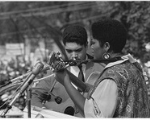Growing up in the Deep South within the era of the Great Depression, Odetta’s initial love with music blossomed through hearing the painfully honest tales sung by the struggling people throughout the 1930s. Continuing to be musical throughout her adolescence, Odetta eventually graduated from Los Angeles City College in 1950 with a degree in music. Soon after, while singing in a traveling chorus, Odetta found herself in San Francisco and deeply submerged in an obsession with folk music. Odetta gained notoriety with her first solo album Odetta Sings Ballads and Blues, as well as with her live recordings of her performance at Carnegie Hall. The 1960s proved to be Odetta’s most significant years. Throughout this time, Odetta used her influential voice to promote black equality. Performing at rallies and demonstrations, Odetta gave one of her most widely acclaimed appearances on the steps of the Lincoln Memorial after being introduced by Martin Luther King Jr. In 1999, Odetta was awarded the National Medal of Arts, in 2004, she was named a Kennedy Center Honoree, and in 2005 she received the Living Legend Award by the Library of Congress. Odetta’s music was so powerful that it would later be christened the “Soundtrack of the Civil Rights Movement” and go on to influence musicians and activists alike for generations.
Excerpt from article “Ten of Blues Influential Artists” by Victoria Shaffer on Guitar Girl Magazine

